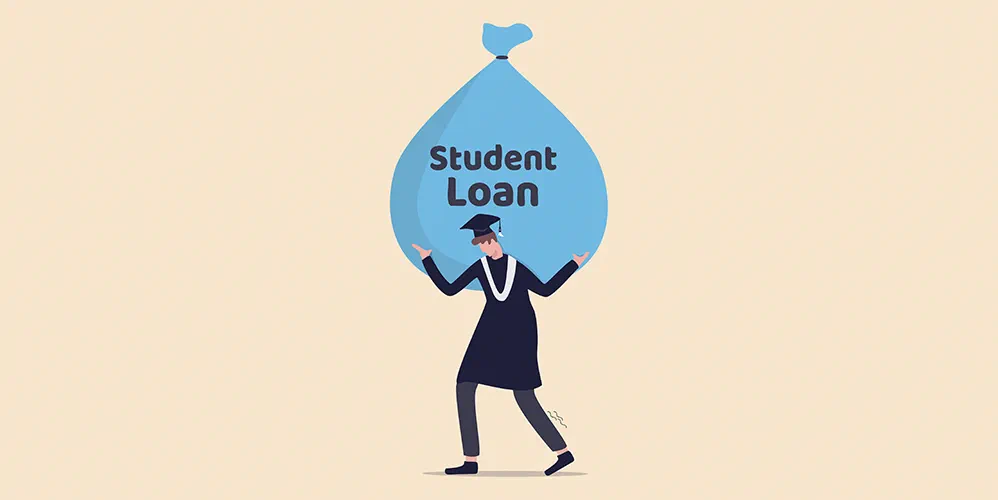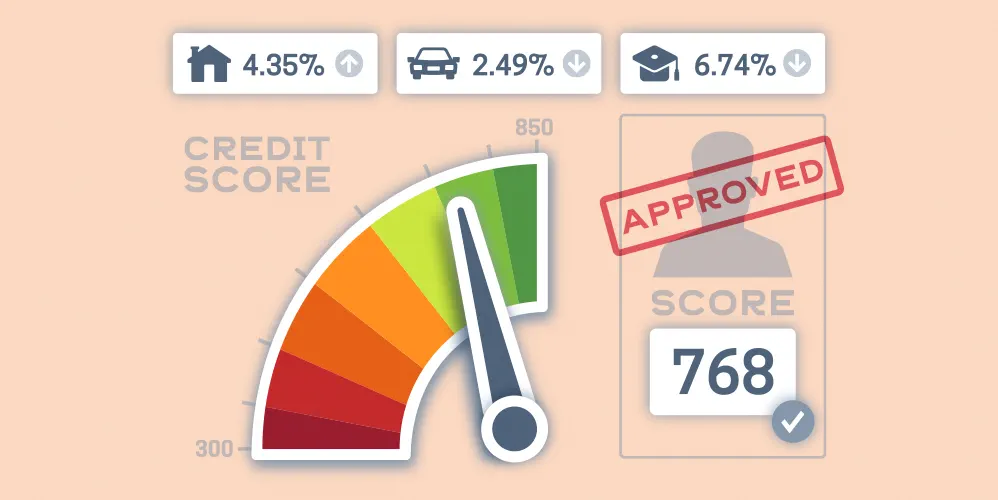
Why You Should Prepay Your Student Loan? Know the Benefits
03 Jun 2022

Table of Content
When taking an education loan, you need to carefully plan loan repayment even before your EMIs are due. This way, you can save yourself from falling into a financial crisis in the first few years of your career. Now, you may wonder - should I pay off my student loans before the tenure of the loan is complete?
The answer to that question can vary between people. For some, repaying education loans before the tenure is due can be advantageous whereas for others, it might be better to let the loan run its pre-set course.
Today, we will show you how repaying student loan EMIs before the tenure is complete can be quite beneficial for you. To help you gain a better understanding, here are some of the benefits of prepaying your student loan.
• Decreases your DTI
DTI or Debt to Income ratio is the summation of your monthly debt payments divided by your monthly income multiplied by 100. For example, if your monthly debt pay-out is Rs 10,000 and your monthly income is about Rs 25,000, then your DTI is 40%. This means that about 40% of your monthly income is allocated towards the payments of your debts. DTI is one of the most important parameters taken into consideration when you apply for major loans, such as a home loan.
Typically, having a DTI that is lower than 35% implies that you have enough money to take on more debts. However, a DTI above 50% goes to show the lender that you have quite a lot of debt left to repay. This could portray you as a risky borrower. Having a DTI above 50% significantly decreases your chances of procuring other types of loans such as home loans, car loans, and personal loans. If you plan to take on any of these other types of loans soon, you might want to prepay your student loan first.
• Promotes better control of finances
If you have loans, you are forced to keep aside a fixed amount of money every month for the EMI payments even if you wish to use your funds for some other purpose. Hence, you do not have complete control over your finances. This can prove to be a major obstacle especially if you need the money for making an investment, or simply for that vacation you really need. You would also need to think twice about using your money for an emergency if funds have been allocated for your monthly EMI payments. This kind of debt can get in the way of sudden and unforeseen expenses. With this in mind, you may want to complete your student loan payments as quickly as possible to get better control over your finances.
Quick Tip:
Lenders generally provide a moratorium period for their education loans. This moratorium period is usually 12 months after completion of course. While your EMIs are not due until after the moratorium, you can consider starting payments earlier by taking a part-time job alongside your studies. This will help reduce the burden of your education loan. Remember that the moratorium period is not exempt from interest; interest continues to get charged on your education loan even though your EMIs are not yet due.
What happens to the tax deductions that you get through your student loan?
Under Section 80E of prevailing tax laws, you get tax deductions for your student loan. More specifically, the interest you pay on the student loan qualifies as a deduction. There is no deduction for the principal loan amount. This deduction can be claimed by the self or by parents of the student or the spouse of the student. The deduction is only valid for an education loan that has been taken from an approved financial or charitable institution. A loan borrowed from personal contacts – such as friends – will not qualify for this deduction.
It is important to note that this tax deduction can only be claimed while the loan is active. This means that once you prepay the loan, you can no longer avail the tax exemptions on the interest paid on your student loan. Therefore, if you are planning on prepaying your student loan, you need to evaluate the benefits of prepaying the loan against the benefits of letting the loan run its natural course.
Should I pay off my student loans first and then invest or vice versa?
If you have enough money saved up to repay the student loan without defaulting, you should definitely focus on investing your money. However, if the only money you have is allocated towards the repayment of your student loan, it is better to avoid investing it in an opportunity that poses a risk of capital erosion. Furthermore, student loans and home loans are some of the cheapest forms of debt if you provide collateral. Hence, it is better to not prepay them aggressively. It is important to plan your finances before you take on any debt. You can use an online education loan calculator to make such calculations with ease and efficiently come up with a loan repayment plan.
Prepayment penalties on student loans
Before you decide to prepay your student loan, you need to contact your lender to understand whether they will levy any kind of prepayment penalty. Most leading lenders do not charge any kind of prepayment penalty on education loans. Others may allow you to make larger payments than the EMIs that are due without charging you any penalty. Make sure to find out these charges when signing up for the loan so that you have your information at hand.
If the prepayment penalty is higher than the amount you will save by paying off your student debt early, then you may want to keep your loan running for its original tenure. However, if you have other financial obligations cropping up in the near future, then incurring the penalty might be worthwhile. For instance, if you have plans to buy a home or a car soon, you would definitely want to close your student loan first to free up more credit.
If education loan repayment calculations seem overwhelming, you can always reach out to your lender for help with the same.
Looking for a student loan?
If you are looking for a student loan at affordable interest rates, look no further than Bank of Baroda. Bank of Baroda offers a range of education loans with dedicated loans for technical courses, premier institutes, and foreign studies. Get in touch today to know more.
Popular Articles
Guide to Getting Agriculture Loan: Application, Eligibility & Required Documents
Tag Clouds
Related Articles










Guide to Getting Agriculture Loan: Application, Eligibility & Required Documents
-
Disclaimer
The contents of this article/infographic/picture/video are meant solely for information purposes and do not necessarily reflect the views of Bank of Baroda. The contents are generic in nature and for informational purposes only. It is not a substitute for specific advice in your own circumstances. Bank of Baroda and/ or its Affiliates and its subsidiaries make no representation as to the accuracy; completeness or reliability of any information contained herein or otherwise provided and hereby disclaim any liability with regard to the same. The information is subject to updation, completion, revision, verification and amendment and the same may change materially. The information is not intended for distribution or use by any person in any jurisdiction where such distribution or use would be contrary to law or regulation or would subject Bank of Baroda or its affiliates to any licensing or registration requirements. Bank of Baroda shall not be responsible for any direct/indirect loss or liability incurred by the reader for taking any financial decisions based on the contents and information mentioned. Please consult your financial advisor before making any financial decision.
Why should you choose a Floating rate Home Loan?
Taking a home loan is one of the most common ways to finance the purchase of your dream home. The home loan provider can either charge you a floating or fixed rate of interest on your debt. While a fixed interest rate can help you get a sense of security, a floating interest rate can potentially help you generate savings. For this reason and a few more, many people prefer to procure a floating rate home loan.
Get Education Loan for Studying MBA in Abroad
Higher education helps extra edge to boost your career. It offers you an opportunity to explore your chosen field in great depth and helps you mould yourself into a knowledgeable professional. One of the most popular postgraduate degrees that students opt for these days is an MBA (Master of Business Administration).

